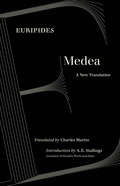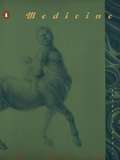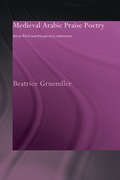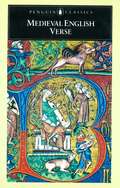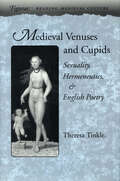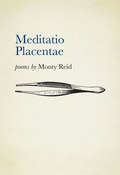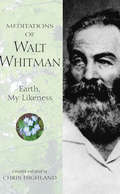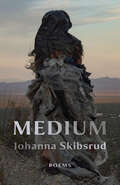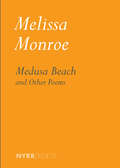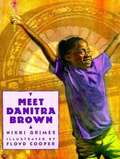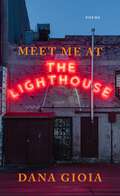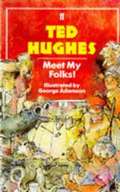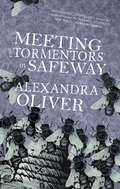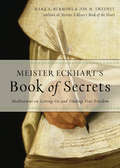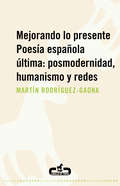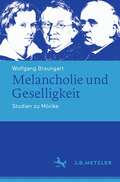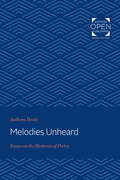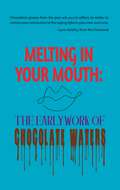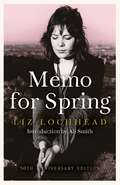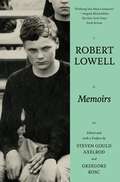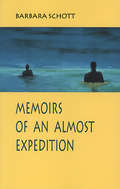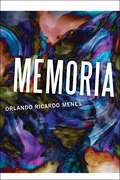- Table View
- List View
Medea: A New Translation
by EuripidesThe Medea of Euripides is one of the greatest of all Greek tragedies and arguably the one with the most significance today. A barbarian woman brought to Corinth and there abandoned by her Greek husband, Medea seeks vengeance on Jason and is willing to strike out against his new wife and family—even slaughtering the sons she has born him. At its center is Medea herself, a character who refuses definition: Is she a hero, a witch, a psychopath, a goddess? All that can be said for certain is that she is a woman who has loved, has suffered, and will stop at nothing for vengeance. In this stunning translation, poet Charles Martin captures the rhythms of Euripides’ original text through contemporary rhyme and meter that speak directly to modern readers. An introduction by classicist and poet A.E. Stallings examines the complex and multifaceted Medea in patriarchal ancient Greece. Perfect in and out of the classroom as well as for theatrical performance, this faithful translation succeeds like no other.
Medicine
by Amy GerstlerAmy Gerstler has won acclaim for complex yet accessible poetry that is by turns extravagant, subversive, surreal, and playful. In her new collection, Medicine, she deploys a variety of dramatic voices, spoken by such disparate characters as Cinderella's wicked sisters, the wife of a nineteenth-century naturalist, a homicide detective, and a woman who is happily married to a bear. Their elusive collectivity suggests, but never quite defines, the floating authorial presence that haunts them. Gerstler's abiding interests -- in love and mourning, in science and pseudo-science, in the idea of an afterlife -- are strongly evident in these new poems, which are full of strong emotion, language play, surprising twists, and a wicked sense of black humor.
Medicine
by Amy GerstlerAmy Gerstler has won acclaim for complex yet accessible poetry that is by turns extravagant, subversive, surreal, and playful. In her new collection, Medicine, she deploys a variety of dramatic voices, spoken by such disparate characters as Cinderella's wicked sisters, the wife of a nineteenth-century naturalist, a homicide detective, and a woman who is happily married to a bear. Their elusive collectivity suggests, but never quite defines, the floating authorial presence that haunts them. Gerstler's abiding interests--in love and mourning, in science and pseudo-science, in the idea of an afterlife--are strongly evident in these new poems, which are full of strong emotion, language play, surprising twists, and a wicked sense of black humor.
Medieval Arabic Praise Poetry: Ibn Al-Rumi and the Patron's Redemption (Routledge Studies in Middle Eastern Literatures #No. 2)
by Beatrice GruendlerThis book gives an insight into panegyrics, a genre central to understanding medieval Near Eastern Society. Poets in this multi-ethnic society would address the majority of their verse to rulers, generals, officials, and the urban upper classes, its tone ranging from celebration to reprimand and even to threat.
Medieval English Verse
by Brian StoneShort narrative poems, religious and secular lyrics, and moral, political, and comic verses are all included in this comprehensive collection of works from the thirteenth and fourteenth centuries.
Medieval Venuses and Cupids
by Theresa TinkleMedieval Venuses and Cupids analyses the transformations of the love deities in later Middle English Chaucerian poetry, academic Latin discourses on classical myth (including astrology, natural philosophy, and commentaries on classical Roman literature), and French conventions that associate Venus and Cupid with Ovidian arts of love. Whereas existing studies of Venus and Cupid contend that they always and everywhere represent two loves (good and evil), the author argues that medieval discourses actually promulgate diverse, multiple, and often contradictory meanings for the deities. The book establishes the range of meanings bestowed on the deities through the later Middle Ages, and draws on feminist and cultural theories to offer new models for interpreting both academic Latin discourses and vernacular poetry.
Meditatio Placentae
by Monty ReidFrom yoghurt tubs to pop-up books to bobcats, from cement trucks to lost socks to the products of conception, Meditatio Placentae, Monty Reid's twelfth collection, is a book about unruly stuff. Stuff that functions but also stuff that exceeds, stuff that dreams. A gathering of short poems wrapped into longer sequences, this is a book that pays attention to the world, in all its dizzying forms. The poems in Meditatio Placentae cluster around certain ideas, experiences, narratives; sometimes they cohere, sometimes they only assemble, but they are always at crossroads where people and objects collide. In these poems matter itself--including the placenta of the title poem--is vibrant, and argues for its rightful recognition.
Meditations of Walt Whitman
by Chris HighlandA pocket-sized compendium of passages from Walt Whitman's Leaves of Grasspaired with the relevant words of a variety of historical and contemporary thinkers, such as Margaret Fuller, Friedrich Nietzsche, Jane Goodall, Mark Twain, Marc Chagall, Helen Keller, Buddha, Dante, and Bhagavad Gita
Medium
by Johanna SkibsrudFrom award-winning writer Johanna Skibsrud, Medium uses language as a bridge across experience, sensibility, and time.These deeply resonant and performative poems share the lives and perspectives of women who— in their roles as biological, physical, or spiritual mediums— have helped to shape the course of history. Reckoning with the dominant historical narratives of each woman' s era, Skibsrud underscores the power of poetry to bring about new formulations for understanding the relationship between past and present, self and other.Helen of Troy, Anne Boleyn, Shakuntala Devi, Hypatia of Alexandria, Marie Curie: Medium interprets the voices of women vilified by history, silenced by famous husbands, forced into sex work, or wrongly accused.Each exploration begins with a brief vignette inspired by the “ vidas” that once began manuscripts of the troubadours. Both vidas and poems provide lyrical reinterpretations of real and imagined elements in the lives of scholars, scientists, computer engineers, mystics, entrepreneurs, artists, nurses, and other leaders.
Medusa Beach
by Melissa MonroeA new collection from one of the most exciting voices in American poetry.For many years, Melissa Monroe has been assembling one of the most distinctive bodies of work in contemporary American poetry, drawing on all different kinds of writing, from technical manuals to books of spells to dictionaries of slang, to explore the many ways—poetry is, after all, one of them—in which we human beings seek to know and control the elusive realities of the world around and within us. Her subject is both the strangeness of things and the strangeness of the things we think, and she has an unsurpassed eye for the wilderness between them that we inhabit. The poems collected in Medusa Beach include &“Planetogenesis,&” recording the life of an imaginary planet; &“Whiz Mob,&” a sequence of haikus composed in the criminal argot of 1940s America; &“Frequently Asked Questions About Spirit Photography&”; and the title poem, which interweaves an account of the life and thought of the great German philosopher and marine biologist Ernst Haeckel with a meditation on the many historical and natural historical avatars of the figure of Medusa. As formally adventurous as they are rigorous, disconcertingly comic, and deeply strange, the poems in Medusa Beach are the work of a true American original.
Meet Danitra Brown
by Nikki GrimesZuri Jackson wants readers to meet her friend, Danitra Brown, the "most splendiferous girl in town." In 13 spirited rhymes, Zuri narrates an unforgettable portrait of the many ways in which friends bring out the best in each other.
Meet Me at the Lighthouse: Poems
by Dana GioiaDana Gioia has been hailed for decades as a master of traditional lyric forms, whose expansive and accessible poems are offerings of rare poignancy and insight. In Meet Me at the Lighthouse, he invites us back to old Los Angeles, where the shabby nightclub of the title beckons us into its noirish immortality. Elsewhere, he laments the once-vibrant neighborhood where he grew up, now bulldozed, and recalls his working-class family of immigrants. Gioia describes a haunting from his mother on his birthday, Christmas Eve. Another poem remembers his uncle, a US Merchant Marine. And “The Ballad of Jesús Ortiz” tells the story of his great-grandfather, a Mexican vaquero who was shot dead at a tavern in Wyoming during a dispute over a bar tab. “I praise my ancestors, the unkillable poor,” Gioia writes. This book is dedicated to their memory. Including poems, song lyrics, translations, and concluding with an unsettling train ride to the underworld, Meet Me at the Lighthouse is a luminous exploration of nostalgia, mortality, and what makes a life worth living and remembering.
Meet My Folks!
by Ted HughesOther folk's folks get so well known, And nobody knows about my own. Meet a host of strange and wonderful characters as Ted Hughes introduces us to his family.
Meeting the Tormentors in Safeway
by Alexandra OliverA CANADIAN POETRY BOOK OF THE YEAR, THE NATIONAL POST"Alexandra Oliver has many arrows in her quiver-all of them sharpened to a fine point. This is an excellent and entertaining collection."-TIMOTHY STEELEIn Meeting the Tormentors in Safeway, Alexandra Oliver zooms in on the inertias, anxieties, comedies, cruelties, and epiphanies of domestic life:They all had names like Jennifer or Lynneor Katherine; they all had bone-blonde hair,that wet, flat cut with bangs. They pulled your chairfrom underneath you, shoved their small fists inyour face. Too soon, you knew it would begin,those minkish teeth like shrapnel in the air,the Bacchic taunts, the Herculean dare,their soccer cleats against your porcine shin,that laugh, which sounded like a hundred birdsescaping from a gunshot through the reeds-and now you have to face it all again:the joyful freckled faces lost for wordsin supermarkets, as those red hands squeezeyour own. It's been so long! They say. Amen.Oliver's poems, which she describes as "text-based home movies," unveil a cinematic vision of suburbia at once comical and poignant: framed to renew our curiosity in the mundane and pressing rhyme and metre to their utmost, Meeting the Tormentors in Safeway is a five-star performance from Canada's new formalist sensation."Alexandra Oliver is in full command of a saber wit and impeccable ear. Lucky the reader along for the ride."-JEANNE MARIE BEAUMONT"Brilliantly contemporary poems in traditional forms, the work of a stunning new voice."-CHARLES MARTINAlexandra Oliver was born in Vancouver, Canada and divides her time between Toronto and Glasgow, Scotland. Her most recent book is Meeting the Tormentors in Safeway (Biblioasis). She currently teaches in the Stonecoast MFA Program at the University of Southern Maine.
Meister Eckhart's Book of Secrets: Meditations on Letting Go and Finding True Freedom
by Jon M. Sweeney Mark S. BurrowsAn elegant rendering of the great mystic's thoughts on the mysteries of the authentic life <P><P>This is a little book about soul freedom. It is a book about discovering the secret to all the things we most desire: contentment, meaning, peace of mind, and true freedom. This skillfully edited translation of selections from the writings of Meister Eckhart provides a roadmap to the spiritual life for contemporary seekers. <P><P> Eckhart takes us on a journey of discovery; a journey in which we learn to let go, relinquish our need to know everything, and lose those things that we think are important for a life of worth. And in the end he shows us that the true secret is this: to find yourself, you must lose yourself.Here is timeless wisdom from a medieval mystic who has influenced a wide range of spiritual teachers and mystics both inside and outside the Christian tradition. Erich Fromm, Arthur Schopenhauer, Dag Hammarskjöld, Eckhart Tolle, Richard Rohr, D. T. Suzuki, Rudolf Steiner, and Matthew Fox have all credited Eckhart as being an important influence on their thought. In addition, his work has influenced the development of 20th-century American Buddhism and the Theosophical tradition.Divided into five sections—Seeking the Light, Facing Darkness, Risking Love, Knowing Nothing, and Embracing Everything—the book leads readers on the path to an authentic spiritual life.
Mejorando lo presente
by Martín Rodríguez-GaonaPues si Paul Éluard dijo aquello tan sabio y rotundo de "La poesía es algo absolutamente necesario aunque me gustaría saber para qué", imagínense lo que diría de un ensayo sobre poesía: "Este libro es absolutamente innecesario y por tanto polémico, inevitable, posmoderno y personal". Si la poesía, Homero dixit, es un virus troyano programado para alterar el disco duro de la imaginación colectiva y un poeta es un explorador o un señuelo lingüístico que se envía por delante para tratar de localizar los campos de minas, un ensayo es una resonancia semántica del cuerpo poético que nos ha tocado en suerte y nos muestra de qué adjetivos cojeamos y de qué sustantivos andamos escasos.La poesía como moneda no mercantil, expulsada de la lógica del mercado y por tanto suelta, promiscua, disponible y viajera. Fuera del mercado pero invadiendo las nuevas geografías virtuales. Poetas con afanes similares de independencia y ruptura, surgidos sin contar con una plataforma o programa común, y que expresan sus intuiciones sobre asuntos de gran relevancia: la subjetividad construida por los medios de comunicación, los avances tecnológicos y científicos, la globalización, etc.- elaborando nuevas propuestas bajo una certidumbre extraña. Una convicción en buena medida ajena a criterios de repercusión social o económica: la certeza de que el arte verbal mantiene su vigencia en la era postindustrial como un reflejo primordial de la experiencia humana. No spam. Agregar a favoritos.
Mejorando lo presente. Poesía española última: Poesía española última: posmodernidad, humanismo y redes
by Martín Rodríguez-GaonaUn polémico ensayo sobre la poesía española más viva, dinámica y actual, esa que nace de un movimiento poético multiforme y desprovisto de plataforma, formado por un grupo numeroso de autores y autoras que irrumpe en la escena literaria con obras renovadoras, de inusual energía y calidad, en un tiempo donde la literatura comercial parecía imponerse completamente. Aviso de lectura Pues si Paul Éluard dijo aquello tan sabio y rotundo de «La poesía es algo absolutamente necesario aunque me gustaría saber para qué», imagínense lo que diría de un ensayo sobre poesía: «Este libro es absolutamente innecesario y por tanto polémico, inevitable, posmoderno y personal». Si la poesía, Homero dixit, es un virus troyano programado para alterar el disco duro de la imaginación colectiva y un poeta es un explorador o un señuelo lingüístico que se envía por delante para tratar de localizar los campos deminas, un ensayo es una resonancia semántica del cuerpo poético que nos ha tocado en suerte y nos muestra de qué adjetivo cojeamos y de qué sustantivos andamos escasos. La poesía como moneda no mercantil, expulsada de la lógica del mercado y por tanto suelta, promiscua, disponible y viajera. Fuera del mercado pero invadiendo las nuevas geografías virtuales. Poetas con afanes similares de independencia y ruptura, surgidos sin contar con una plataforma o programa común, y que expresan sus intuiciones sobre asuntos de gran relevancia -la subjetividad construida por los medios de comunicación, los avances tecnológicos y científicos, la globalización, etc.- elaborando nuevas propuestas bajo una certidumbre extraña. Una convicción en buena medida ajena a criterios de repercusión social o económica: la certeza de que el arte verbal mantiene su vigencia en la era postindustrial como un reflejo primordial de la experiencia humana. No spam. Agregar a favoritos.
Melancholie und Geselligkeit: Studien zu Mörike
by Wolfgang BraungartWenigen Dichtern der Moderne gelingt es so wie Mörike, Literatur aus dem sozialen Lebenszusammenhang hervorgehen zu lassen und auf ihn zu beziehen. Dabei steigern und intensivieren sich Kunst und Leben wechselseitig. Mit höchster poetischer Sensibilität macht Mörike seine Literatur durchlässig für das soziale Leben; ja, er macht es zu einem Formprinzip. Die durchgehende, poetisch so produktive Melancholie seines Werkes, von der Forschung oft beobachtet, zeigt aber, dass Freundschaft, Geselligkeit, soziale Zugehörigkeit die poetische Subjektivität nicht wirklich beheimaten können, so sehr sie sich genau danach sehnt. Der Band versammelt Studien zur Lyrik und zu den Erzählungen "Mozart auf der Reise nach Prag" und "Das Stuttgarter Hutzelmännlein".
Melodies Unheard: Essays on the Mysteries of Poetry (Johns Hopkins: Poetry and Fiction)
by Anthony HechtOriginally published in 2003. The fruit of a lifetime's reading and thinking about literature, its delights and its responsibilities, this book by acclaimed poet and critic Anthony Hecht explores the mysteries of poetry, offering profound insight into poetic form, meter, rhyme, and meaning. Ranging from Renaissance to contemporary poets, Hecht considers the work of Shakespeare, Sidney, and Noel; Housman, Hopkins, Eliot, and Auden; Frost, Bishop, and Wilbur; Amichai, Simic, and Heaney. Stepping back from individual poets, Hecht muses on rhyme and on meter, and also discusses St. Paul's Epistle to the Galatians and Melville's Moby-Dick. Uniting these diverse subjects is Hecht's preoccupation with the careful deployment of words, the richness and versatility of language and of those who use it well.Elegantly written, deeply informed, and intellectually playful, Melodies Unheard confirms Anthony Hecht's reputation as one of our most original and imaginative thinkers on the literary arts.
Melputtur Narayana Bhatta
by C. RajendranMonograph on the great scholar poet of Kerala who is second only to the great Sankaracarya in stature.
Melting in Your Mouth: The Early Work (Sapphic Classic)
by Chocolate WatersThe best of Chocolate Waters' poetry finds its home in Melting in Your Mouth: The Early Work of Chocolate Waters. During the Women's Liberation Movement, Waters traveled around the United States to share her erotic, angry, and feminine poems, gathering throngs of lesbian admirers. Waters was a modern-day lesbian-feminist bard performing her poems with theatrical flair. Waters' poems grapple with gender norms, sexual harassment, and hetero-patriarchal publishing expressing the rage that comes with experiencing the second-class citizenry of womanhood. Even more radical, Waters' writes of lesbian intimacy and sex, calling attention to nuances of family and belonging in the context of her identity as a lesbian.Melting in Your Mouth is a treasury of Waters' early work. As witness to and participation in Gay Liberation and the Women's Liberation Movement of the seventies and eighties, Waters' poems also witness a genealogy of living and laughing authentically against all odds.
Memo for Spring
by Liz LochheadLiz Lochhead is one of the leading poets writing in Britain today. This, her debut collection, published in 1972, was a landmark publication. Writing at a time when the landscape of Scottish poetry was male dominated, hers was a new voice, tackling subjects that resonated with readers – as it still does. Her poetry paved the way, and inspired, countless new voices including Ali Smith, Kathleen Jamie, Jackie Kay and Carol Ann Duffy. Still writing and performing today, fifty years on from her first book of poetry, Liz Lochhead has been awarded the Queen’s Gold Medal for Poetry and was Scotland’s second modern Makar, succeeding Edwin Morgan. Memo for Spring is accessible, vital and always as honest as it is hopeful. Driving through this collection are themes of pain, acceptance, loss and triumph.
Memoirs
by Robert LowellA complete collection of Robert Lowell’s autobiographical prose, from unpublished writings about his youth to reflections on the triumphs and confusions of his adult life.Robert Lowell's Memoirs is an unprecedented literary discovery: the manuscript of Lowell’s lyrical evocation of his childhood, which was written in the 1950s and has remained unpublished until now. Meticulously edited by Steven Gould Axelrod and Grzegorz Kosc, it serves as a precursor or companion to his groundbreaking book of poems Life Studies, which signaled a radically new prose-inflected direction in his work, and indeed in American poetry. Memoirs also includes intense depictions of Lowell’s mental illness and his determined efforts to recover. It concludes with Lowell’s reminiscences of other writers, among them T. S. Eliot, Robert Frost, Ezra Pound, John Berryman, Anne Sexton, Hannah Arendt, and Sylvia Plath. Memoirs demonstrates Lowell’s expansive gifts as a prose stylist and his powers of introspection and observation. It provides striking new evidence of the range and brilliance of Lowell’s achievement.Includes black-and-white photographs
Memoirs of an Almost Expedition
by Barbara SchottIn Memoirs of an Almost Expedition, Barbara Schott peels back the skin of language to reveal its musculature, its bone. She also peels back the skin of relations, the intimate rub of self against self, to find both great longing and great loss. Schott marks how the heart bends to words, bends itself with words, in her poetic "novel" "Archipelago" her marvelous sequence "hymens" and in each discrete poem in this lovely book.
Memoria: Poems
by Orlando Ricardo MenesBorn to Cuban parents in Lima, Perú, raised in Miami among political exiles, and having spent two years in Francoist Spain, Orlando Ricardo Menes pays tribute to the resilience and tradition that shape Hispanic culture across the globe while critiquing the hypermasculine characteristics embedded within. Ripe with pride and shame, beauty and aversion, Memoria relays the personal path one takes while navigating the complexities of heritage. Throughout his life, the ever-present concept of machismo has created turmoil and grief for Menes, who aligns his sensibilities with a more compassionate expression of masculinity. In poems about the Franco dictatorship and the Spanish Civil War, Menes assails the fascists’ preoccupation with violence and domination as tokens of manliness. Meditations on the music of Menes’s youth also underscore a young man’s desire for alternative versions of manhood. Alice Cooper and Lou Reed offer examples of self-liberation from the repressive regime: “Cropped head, whitewashed face, O Lou, our goth-butch apostle / In skintight leather pants, eagle’s-head buckle on a rhinestone belt . . . Our mothers horrified to have borne sons so twisted, so perverse, / Their mop sticks primed to beat us into Marlboro Men.” Menes balances these unflinching criticisms with celebratory lines for España as a mother country: “We . . . sailed in silence on the asphalt currents / to Madrid’s Puerta del Sol, our little car / gliding like a caravel to this Gate of the Sun, / Spain’s navel, point zero, her alpha and omega, / where the empire was born and died, / where every road and every life begins and ends.” Menes’s honest embrace of his heritage includes fond remembrance of his mother, “we talked about your house in / Havana, so close to the bay your young eyes winced / in salt air,” and sincere expressions of cultural reckoning, “Nations die but blood lives forever in la memoria, / So pray to your Abuelo as you would God Himself / Who made earth, sky, and water from the void.” At once rich with sensorial memories and rife with conflicts of identity, Memoria expands representations of Hispanic culture while drawing on universal themes of love, belonging, and rebellion.
